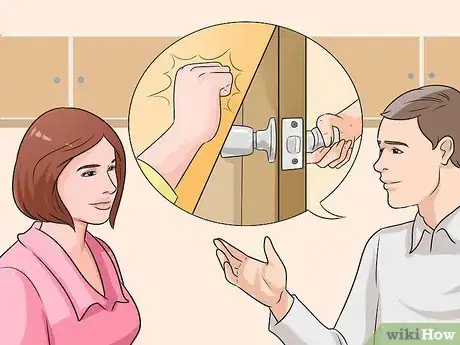This article was co-authored by Julia Yacoob, PhD. Dr. Julia Yacoob is a Licensed Clinical Psychologist practicing in New York City. She specializes in Cognitive Behavioral Therapy (CBT) for adults coping with a variety of symptoms and life stressors. Dr. Yacoob earned an MS and Ph.D. in Clinical Psychology from Rutgers University, and pursued specialized training at Weill Cornell Medical College, New York Presbyterian Hospital, Memorial Sloan-Kettering Cancer Center, the Institute for Behavior Therapy, and Bellevue Hospital Cancer Center. Dr. Yacoob is a member of the American Psychological Association, Women’s Mental Health Consortium, NYC Cognitive Behavioral Therapy Association, and Association for Cognitive and Behavioral Therapies.
There are 9 references cited in this article, which can be found at the bottom of the page.
This article has been viewed 169,288 times.
Working with your ex is a situation that can be daunting and potentially very messy. Breaking up is hard to do even when you don't have to see your ex regularly in the workplace. However, it is possible to navigate these waters and create a civil relationship between you and your ex. With directness and clear focus you can even turn underlying tension into good motivation to attend better to yourself and your work-related goals.
Steps
Getting (and Staying) over the Breakup
-
1Get your priorities straight. Set a clear intention to prioritize and stay motivated for work, even with your ex around.[1] Weigh your options, seeing that it is a decision and likely not an absolute imperative to take on a workplace environment with your ex.
- Is the job easily replaceable or temporary? Some reflection may show you that working with your ex is doing more harm than good, keeping you in a place of pain and confusion that the job is not necessarily worth.
-
2Greet your remaining feelings openly and honestly.[2] When we try as hard as we can not to think about something, it becomes impossible not to think about it. This is called the "white bear effect" and works the same for all kinds of temptations.[3] So, don’t push your ex out of your mind when they pop up unexpectedly. By doing this you are eliminating the "forbidden fruit" feeling that can distract from work and cause you to dote on the past relationship. Also, letting yourself think about your ex, you may access some thoughts that give you greater clarity about the relationship (and thus, more closure).
- The less you resist the fact that your ex is still in your life, the better. Sharing a workplace means that you must accept your ex’s presence and the feelings that will unavoidably come with seeing him or her regularly. Allow these feelings to wane naturally rather than forcing them out of your head. Trying to force feelings away creates passive aggression, moodiness, and the feelings are likely to come back with a vengeance when you least expect them to.
- Just because you are letting yourself feel things in relation to your ex, this does NOT mean that you must share these feelings in the workplace. Stick close to your journal and if you need to share what comes up, try talking to friends or family that have some distance from your workplace.
Advertisement -
3Focus on your goals. Writing in a journal, outline the goals you have related to your career. Start small, thinking about how to do your work more efficiently each day, gradually increasing scale to goals for the month, the company, etc. Make sure you include how your career goals also play into the wider scope of what you want for yourself (like happiness, physical well-being, and freedom from stress). By making these connections you will see the connection between your career goals and your broader personal happiness. This will help you see your career goals differently, motivating you more and more to spend your time at work really nurturing these goals.
-
4Seek support from others.[4] Even if you and your ex still talk occasionally, make sure that your ex is not the person you call in extreme moments. Since your ex is so nearby, you might be tempted to call him or her to vent about an especially bad day or to share an exciting new achievement or opportunity. But, these are moments to share with someone who you want a deeper relationship with instead.
- Continuing to give your ex this position in your life will keep you more emotionally attached to him or her than is necessary for a successful working relationship. This can keep you feeling as though you rely on his or her presence, at work or otherwise. The trick is to be able to see your ex while keeping in mind that they do not serve the purposes for you as they did while in a relationship. So, delegating these roles (person I can vent to, friend who can help me with tech issues that my ex used to handle) will keep you supported and strong in times of stress or excitement.
-
5Stay focused on the present. Especially during hard days, it can come naturally to look at your ex and idealize how great things were when you were together. No matter how over your ex you are, our instinctual minds are set up to seek out the best possibilities for short-term comfort and hope. Learning mindfulness techniques can help you focus on the present moment and redirect your daydreams about times when things were different.
- Continually remind yourself that things have changed between the two of you by focusing on what’s going on in the immediate interaction. Is your ex giving a presentation at a meeting? Notice that your attention is shifting from the business of the meeting to your ex’s pretty eyes and all the memories they bring up. Then, without judging yourself for having wandered off, bring your awareness back to the task at hand. You may want to ally yourself closely with a diligent co-worker whose attentiveness will help bring you back “in the zone” of work duties.
Communicating Effectively with Your Ex
-
1Lay down terms of engagement. [5] Take the first chance you have to honestly address the situation at your workplace and the role the past relationship plays in it. Initiate the conversation away from curious co-workers, and preferably outside of the workplace entirely. Let your ex know that you intend to keep drama from the past outside of work. Be sure to put your best foot forward, and mention that having a cordial working relationship is important for both your jobs and your happiness. If you make strong efforts to be civil and respectful, beginning with this talk, your ex will very likely follow suit. Try to come to agreements about the following:
- Socializing together with co-workers.
- Being involved in (or trying to avoid) working closely on projects together.
- Leaving baggage outside of the workplace.
- Opening the possibility to address serious problems outside of work, if they come up at all.
- However, the situation of the workplace does require that you remain somewhat flexible to surprise hallway run-ins with your ex. Be aware that there are some things that you can control, like the terms of engagement between you and your ex when you are interacting, but others that you can’t. You may not be able to control how often you see your ex.
-
2Claim the distance that you want.[6] If you find yourself wanting a break from the proximity you are maintaining, don't be afraid to take it. Give yourself the same respect as anyone else in a difficult situation. Even though you may have already discussed keeping a safe distance with your ex, you are responsible for being direct and acting on your wishes. This includes making your intentions known when other people are also involved. By communicating your desire for distance, you will leave no room for people to speculate and gossip about what might be going on.
- For example, say you have been asked to have drinks with your co-workers after work and you know your ex has been invited too. Instead of taking the opportunity to let everyone know that you don't want to be around your ex for an extra minute, graciously let them know that you do not wish to go out because you'd like time to yourself. Remind yourself that not wanting to socialize won't be permanent.
-
3Pay attention to your body language. Not sure how you're coming off to your ex and other co-workers? The way that you stand, position yourself in relation to others, and gesture can be the clearest signals of discomfort or awkwardness. So, by noticing your body language you can show yourself what others see and adjust yourself accordingly.
- For example, say you are discussing a work-related issue with your ex. You may notice that you are not making eye contact or that you have started to fidget with your hands. Both of these actions send signs that you are uncomfortable in the situation. At this point you can "act as if" and adjust your body language to make you and your ex more at ease.
- If you begin to see that your body language frequently signals anxiety and discomfort, you may want to spend more time reflecting on how you're feeling. Correcting your body language in the interaction is a useful way to get by, but ultimately it may clue you in to deeper issues that can be addressed outside of the workplace.
-
4Talk out differences.[7] Even after you and your ex are clear about wanting to create a civil work environment, issues may arise that bring up old frustrations. If this happens, don't be afraid to pull your ex aside and let them know what isn't working for you. Be sure that you are owning your feelings rather than criticizing or judging your ex.[8] Depending on the scope and urgency of the problem, you may want to talk outside of the workplace or make arrangements to keep even more distance
- Before talking, think deeply about whether it's truly an issue that cannot be addressed on your own. A good rule of thumb is to only bring up an issue if you have a clear and reasonable request that you feel you need to make.[9] If you would like to request that your ex honor your space by not entering your office unexpectedly, then your need for space is not being met and you have grounds to make a request. If you cannot think of a reasonable request to make (and "stop being a jerk" is not one), chances are good that you are just looking to vent about your discomfort.
- If you do decide to bring up an issue with your ex, make sure that your demeanor is professional, intentional, and realistic about your role in the problem.
-
5Put a stop to game playing. Is your ex doing everything he or she can to sabotage you at work, like circulating embarrassing information or withholding information about a deadline? Take the high road and offer an opportunity to get more closure and clarity about the nature of your relationship and the breakup.
- This may not be something you enjoy, but going to the root of the issue will show your ex that there are better outlets for their resentment than treating you poorly. Since it is your ex who needs this and not you, be willing to concede things that you normally would not. The goal here is to put an end to workplace sabotage, not to express your deep feelings.
- Talking about money is always awkward at work. So, if your ex starts talking to you (or in range) about a raise or a bonus, resist participating by keeping quiet or making it known that you are uninterested in the topic. Avoid indulging your ex's attempts to "one up" you.
-
6Know when enough is enough. Another option for dealing with an extremely disgruntled ex is to have a private meeting with a trusted higher up where you can show evidence of workplace harassment. Keep in mind that this option, while likely allowing you to keep your job, may temporarily hurt your professional reputation.
Maintaining Professionalism
-
1Separate your work and personal life. Having an ex around the workplace means that you’ll have to think twice about your other workplace relationships, too.[10] If you’re tempted to flirt with another co-worker, consider how messy the current situation would get by adding jealousy and contempt to the mix.
- To gauge whether or not your current actions might trigger excessive negativity between you and your ex, think about how you would feel if the shoe was on the other foot. Wouldn’t want to see your ex leaving with the co-worker he or she has always been smitten for? Avoid doing the same out of sensitivity for the situation and a desire to keep it running smoothly.
- What about having to ride the elevator with your ex? Not all friendly conversation have to begin with your juicy life outside the office. Try bringing up a work-related frustration or joke circulating around co-workers that the two of you can share in without issue.
-
2Keep emotional baggage outside of your professional dealings. If you and your ex are working together on a project, make sure that you are not bringing in any sense of guilt or blame for whatever happened in the relationship.[11] Be extra mindful of the decisions you are making and how you are acting and ask yourself if you are being motivated by residual feelings or by the work itself. Imagine that your professional aspirations are your sole guide, and make sure that all of your decisions keep you on track with them.
- For example, your ex is making coffee for everyone and brings you yours, fixed exactly how you like it. Simply smile politely, thank them, and then let them know that you are not looking for any special treatment. While it's a nice gesture, it's more important to avoid reinventing your old way of acting together.
-
3Stick close to other co-workers. To avoid relying too heavily on your ex, make sure that you have other people who make you feel supported at work. This does not mean finding someone to vent to whenever you feel uneasy about seeing your ex. The most important thing is that you see someone regularly who you can connect with over something, and the more removed it is from your ex, the better. Seek out someone who has a similar sense of humor to yours, or better, someone with similar professional aspirations. After all, that's what you're at your job pursue.
-
4Resist involving colleagues in residual drama.[12] Misery attracts company, and mentioning that you are having issues with your ex will make the issue "fair game" for your colleagues to discuss. They may even begin to take sides, re-creating an old drama that doesn't apply to what's currently going on. Other co-workers might feel excluded or embarrassed by your situation and could start shying away from you in general. It's much better to keep your affairs to yourself and your support system outside of the office. This way you can prevent your life from being turned into the office soap opera.
- This is not to say that you have to be overly secretive about your past, just that you avoid making the topic "open". If it feels absolutely necessary to note that you were once in a relationship, be absolutely clear that the relationship is over and that you will not discuss further details. Let others know that you appreciate your privacy and that the topic is not up for conversation.
-
5Stay on task with work-related topics. The best part about working with your ex is the fact that you will be highly motivated to devote all your efforts to your work. If you find yourself drifting into memories you've shared with your ex or all the things that you miss about him or her, remind yourself to dedicate time away from work to address whatever it is that keeps entering your mind. You do not need to resist thinking about your ex, but you do need to make sure that you make other time to spend acknowledging your feelings and honoring what's past.
- Remember that it might be best to avoid sensitive topics altogether. Because it can be difficult to say what will spark lots of emotions surrounding the breakup, try disengaging from sensitive topics. At least initially, you may want to shy away from discussing romance, breakups, and experiences that you know you and your ex have shared.
-
6Increase your non-work social life.[13] All of the new stress created from sharing a workplace with your ex might make you want to ramp up your activities and relationships elsewhere. Go ahead and reconnect with a friend you don't see often enough or make it a point to frequent a new bar. If you are satisfied with your social life more generally, you will be less tempted to mix it into your work or to see work as an opportunity to spend meaningful time around others.
References
- ↑ http://www.huffingtonpost.com/2012/05/15/friends-with-ex-should-yo_n_1516245.html
- ↑ Julia Yacoob, PhD. Clinical Psychologist. Expert Interview. 15 July 2021.
- ↑ https://www.psychologytoday.com/blog/the-science-willpower/201202/4-science-based-strategies-getting-over-ex
- ↑ http://www.scienceofrelationships.com/home/2012/6/11/how-do-i-get-over-my-ex.html
- ↑ http://www.huffingtonpost.com/2012/05/21/dealing-with-an-ex-at-work_n_1533723.html
- ↑ Julia Yacoob, PhD. Clinical Psychologist. Expert Interview. 15 July 2021.
- ↑ Julia Yacoob, PhD. Clinical Psychologist. Expert Interview. 15 July 2021.
- ↑ Rosenberg, Marshall B. Nonviolent communication: A language of compassion. Encinitas, CA: PuddleDancer Press, 1999.
- ↑ Rosenberg, Marshall B. Nonviolent communication: A language of compassion. Encinitas, CA: PuddleDancer Press, 1999.
- ↑ Hazan, Cindy, and Phillip R. Shaver. "Love and work: An attachment-theoretical perspective." Journal of Personality and social Psychology 59.2 (1990): 270.
- ↑ http://www.umkc.edu/starr/Workplace_Professionalism.pdf
- ↑ http://www.umkc.edu/starr/Workplace_Professionalism.pdf
- ↑ Adams, Gary A., Lynda A. King, and Daniel W. King. "Relationships of job and family involvement, family social support, and work–family conflict with job and life satisfaction." Journal of applied psychology 81.4 (1996): 411.














































































